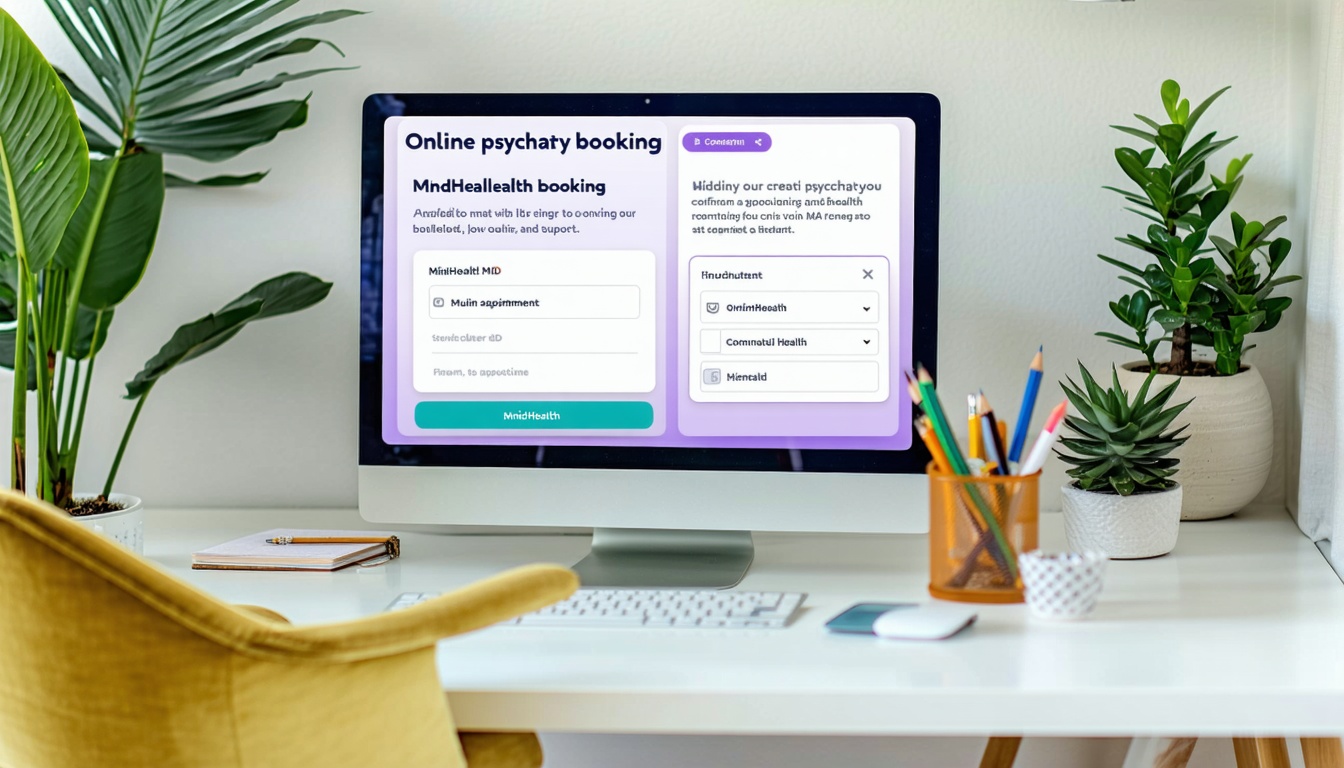Picture this: you’re looking for immediate yet effective support for yourself or someone you love, and you stumble upon the idea of a short term psychiatry session. You might wonder if something that’s “short term” can really bring meaningful relief. The answer is a resounding yes. In many instances, engaging in a concise, focused plan of mental health care can help stabilize your situation and equip you with the tools you need to move forward.
Short-term therapy approaches have been around for decades, rising in prominence back in the 1950s and garnering even more popularity in the 1980s [1]. These streamlined sessions don’t skimp on quality or depth. Instead, they concentrate on addressing your most pressing challenges, whether you’re dealing with sudden changes in your life circumstances, anxiety spikes, or transitions that call for immediate attention.
If you’re exploring telehealth psychiatry, medication-assisted treatment (MAT), or TMS (Transcranial Magnetic Stimulation), MindHealth MD stands ready to help. Our team understands that sometimes, you need help sooner rather than later. By focusing on a set series of sessions, you get a game plan that zeroes in on practical goals, real-time coping skills, and a path to feeling better without an indefinite commitment.
Below, we’ll walk through everything you need to know about short term psychiatric care, from setting practical therapy goals to comparing short vs. long-term approaches. You’ll also discover why MindHealth MD’s telehealth services, MAT options, and TMS treatments stand out as compelling choices for you or a loved one. Let’s dive in.
Discover short term psychiatry
A short-term mental health approach centers on helping you achieve noticeable improvements in a matter of weeks or months rather than years. Depending on your needs, these sessions typically fall between 10 and 20 visits, but they can sometimes stretch to around 24. Instead of trying to tackle every single life issue at once, you and your therapist pinpoint one or two pressing concerns.
What it means in practice
Short-term psychotherapy typically zeroes in on:
- Specific challenges: Maybe you’re dealing with relationship turmoil or sudden job-related stress.
- Clear-cut goals: Together with a therapist, you decide on outcomes tailored to your biggest mental health priorities.
- Active collaboration: Communication between you and your provider remains vital at every step.
According to the American Psychiatric Association [2], about 75% of individuals see improvement in their mental well-being through therapy. Short-term approaches often intensify this focus, working swiftly so you can learn coping strategies and apply them right away. This immediacy helps build motivation and momentum.
Benefits of a focused timeline
- Fast results: Sometimes, you don’t have a year to wait for relief. Short-term care quickly targets key issues.
- Goal clarity: When there’s a set duration, you’re more inclined to define what success looks like.
- Reduced overwhelm: A narrower timeframe can help you concentrate on immediate solutions rather than getting lost in the bigger picture.
Because short-term therapy addresses immediate priorities, it can complement other services like TMS or MAT if you’re experiencing more complex issues. If you want to schedule something soon, you can always explore our immediate psychiatry appointment option. You’ll have a chance to meet with a MindHealth MD professional promptly and start working toward the relief you need.
Recognize therapy goals
Before you begin any mental health treatment, it’s important to understand what success looks like for you. Goals in therapy act like a compass. They point you in the right direction and keep your sessions proactive instead of meandering. According to one study, short-term treatments can be especially effective when goals focus on the most pressing concerns, as it helps you avoid scattering your energy across too many problems [3].
Short-term vs. long-term goals
- Short-term goals: Typically cover immediate areas like learning a new coping mechanism or reducing daily anxiety. They’re often broken into steps that are achievable within a few sessions.
- Long-term goals: Can span months or even years, targeting deeper or more complex developments like changing longstanding relationship patterns or tackling medical comorbidities.
When you commit to a short term psychiatry session schedule, you’re giving these goals a defined window. You might say: “Within three months, I’d like to reduce panic attacks from daily to weekly.” Or “By the tenth session, I want to feel confident using a specific technique to manage my depressive symptoms.”
Making your goals SMART
SMART (Specific, Measurable, Achievable, Relevant, Time-bound) goal setting gets a lot of buzz for a good reason. It offers an excellent roadmap for therapy objectives:
- Specific: Pinpoint exactly what you aim to achieve.
- Measurable: Decide how you’ll know you’ve succeeded.
- Achievable: Keep the bar within a realistic range.
- Relevant: Make sure your goal matches your overall well-being needs.
- Time-bound: Set a clear deadline, which aligns perfectly with short-term approaches.
Tracking your progress
Journaling daily experiences or using an app for mood tracking can do wonders for gauging how you’re moving toward your goals [3]. You can quickly spot patterns, see what triggers setbacks, and celebrate the small milestones you manage to reach. This sense of achievement plays a big role in keeping you motivated.
Compare short vs long-term care
You might still be on the fence about whether short-term therapy is what you need, or if a more extended route would serve you better. Both approaches have their places. In fact, we often see people begin with a targeted, short-term plan, then follow up with more specialized or occasional sessions down the line if needed.
Table: Short-term vs. long-term therapy
| Aspect | Short-term therapy | Long-term therapy |
|---|---|---|
| Duration | 10-20 sessions (3-5 months, on average) | Months to years |
| Focus | Immediate issues or acute stressors | Deeper exploration of chronic patterns |
| Therapeutic style | Goal-oriented, structured, and time-limited | Broader, more flexible, and exploratory |
| Common benefits | Quick wins, targeted relief, coping tools | In-depth personal growth, complex issue resolution |
| Common challenges | Less time for thorough root-cause analysis | Potential for drifting or losing focus |
In many cases, short-term treatment is enough to bring about meaningful results. Research indicates that short-term therapy methods, like Cognitive Behavioral Therapy (CBT), can be especially successful in reducing symptoms of anxiety, OCD, or mild to moderate depression [4]. If deeper, longstanding issues arise, you can always decide to extend your treatment over the long haul.
When short-term therapy shines
- You have a specific issue, like a notable spike in anxiety or an unforeseen life event.
- You prefer a structured format with clearly outlined goals.
- You want to test out therapy methods without committing to indefinite sessions.
- You feel motivated to actively work on your challenges within a set timeframe.
Conversely, long-term therapy might be appropriate when you have intricately interwoven challenges or deeply rooted trauma requiring more time to address. Even then, short-term therapy can serve as a stepping stone, giving you valuable tools and initial relief.
Why MindHealth MD stands out
Choosing a mental health provider is personal, and you deserve top-tier support. MindHealth MD positions itself as a leading authority for telehealth psychiatry, MAT services, and TMS treatments for several reasons:
Tailored telehealth psychiatry
We understand that modern life can be hectic, and in-person visits aren’t always possible. MindHealth MD offers flexible virtual psychiatry session options, making it easier than ever to fit a short-term or ongoing therapy plan into your schedule. Through secure online consultations, you’ll talk one-on-one with licensed professionals who prioritize your comfort and confidentiality.
Expertise in medication-assisted treatment
If you or a loved one is dealing with substance dependence, medication-assisted treatment can be a game-changer. Our specialized medication assisted treatment services blend therapy with evidence-based prescriptions to manage cravings and withdrawal symptoms. Whether you’re considering mat for opioid addiction or mat for alcohol dependency, our providers will guide you step by step in a supportive environment.
Cutting-edge TMS services
Transcranial Magnetic Stimulation is an option for treatment-resistant depression and certain other conditions. MindHealth MD is dedicated to making TMS accessible and user-friendly. In fact, you can schedule tms treatment to see if this noninvasive approach might be right for you. The therapy uses magnetic pulses to stimulate specific regions of your brain, and many patients report noticeable improvements in mood and outlook after a few weeks.
Comprehensive approach
One of the best parts of working with MindHealth MD is that you’re not limited to one treatment type. A short term psychiatry session plan can pair seamlessly with medication management, TMS therapy, or ongoing talk therapy. Our holistic viewpoint means we’re looking at every angle of your well-being, ensuring you get tailored solutions that fit your lifestyle and condition.
If questions about insurance coverage arise, remember we’re here to help you navigate the process. Explore our insurance accepted psychiatry page to see what’s covered. Our aim is to make top-level mental health care as accessible as possible.
Explore medication-assisted treatment
For many individuals, short-term psychiatric care alone can help alleviate symptoms. But if you’re struggling with specific substance use challenges or co-occurring disorders, a medication-assisted treatment (MAT) plan may be ideal. MAT utilizes FDA-approved medications in conjunction with counseling and behavioral therapies to quickly reduce the harm of withdrawal and support recovery.
How MAT complements short-term therapy
- Immediate symptom relief: Medication can reduce overwhelming physical and psychological distress, giving you the breathing room to focus on therapy goals.
- Structured accountability: Shorter therapy sessions keep you on track with medication protocols and progress checks.
- Controlled environment: You work closely with a provider who monitors dosage and side effects, ensuring you stay safe and informed.
Common medications in MAT
- Buprenorphine: Often used for opioid use disorder, it helps alleviate cravings.
- Naltrexone: Can be used for both alcohol and opioid dependence. It blocks the euphoric effects of substances.
- Disulfiram: Creates an adverse reaction to alcohol, helping deter continued use.
Regardless of the medication, therapy remains integral. Sessions focus on exploring your triggers and unhealthy patterns while building healthier coping mechanisms. At MindHealth MD, we help you adapt MAT to your unique situation. If you’re curious about beginning a MAT plan, check out our telehealth mat consultation. It’s crucial to feel supported right from the first step.
Benefit from TMS therapy
Another cornerstone of cutting-edge mental health care is Transcranial Magnetic Stimulation (TMS). This therapy is often short term compared to indefinite medication regimens, which makes it a powerful pairing with structured therapy sessions.
TMS in a nutshell
- Noninvasive: TMS uses magnetic fields to stimulate underactive areas of the brain often linked to depression.
- No anesthesia needed: The procedure generally takes place in a comfortable outpatient setting.
- Minimal side effects: Most patients report only mild scalp tingling or tenderness during sessions.
People coping with severe depression, especially those who haven’t found success with medication or psychotherapy alone, might see significant relief through TMS [5]. You’ll typically attend multiple appointments over several weeks. Thanks to the efficiency of TMS, you can continue focusing on your short-term therapeutic goals without a huge disruption to your life.
Why choose TMS from MindHealth MD
- Skilled providers: We connect you with transcranial magnetic stimulation providers who specialize in administering TMS safely and effectively.
- Personalized plan: We tailor session frequency and durations based on your symptoms.
- Combined treatment approach: You can easily combine TMS with a structured short-term therapy plan to reinforce overall results.
If you’re curious about how TMS might help you specifically with depression, consider reading up on our tms therapy for depression details. We’re here to talk through whether this avenue fits your present needs.
Plan your short term sessions
Once you decide on a short-term model, it’s time to map out what those sessions might look like. Typically, you’ll meet once or twice per week with your psychiatrist or therapist for a targeted discussion about your key objectives. Each session will build on the last, so consistency is crucial.
Your first appointment
- Assessment: You’ll talk about major symptoms, your medical history, and immediate life stressors.
- Goal-setting: This is where you decide on short-term outcomes, like “reduce panic attacks” or “improve quality of sleep.”
- Treatment plan: Expect a discussion about whether medication, TMS, or purely talk therapy suits your unique situation.
If you’re ready to jump right in, feel free to book psychiatric appointment with our team. That first step can be the most challenging but often the most empowering.
Follow-up visits
Your subsequent sessions might involve:
- Checking in on progress: Are you seeing a drop in symptoms?
- Adjusting medication: If you’re pursuing MAT, dosage tweaks can happen to optimize results.
- Learning new skills: Your therapist might guide you in problem-solving techniques, mindfulness strategies, or cognitive restructuring.
These visits are also a perfect time to explore complementing therapies, such as adding TMS or refining your MAT plan. By focusing on consistent check-ins, you’ll spot issues early and make real-time changes.
Discharge or transition
By the end of your short-term timeline, you should feel more equipped to handle everyday challenges. If you need additional care, you can seamlessly transition to a more extended approach, or keep occasional follow-ups. Some individuals return for check-ins after a few months, while others prefer a brief break before deciding on next steps.
Maximize your session outcomes
Getting the most out of a short term psychiatry session starts with a proactive mindset. If you’re dedicated to following through on homework assignments, journaling, or practicing new coping techniques in daily life, you’ll likely see stronger, faster results.
Quick tips for a better experience
- Come prepared: Reflect on your goals, challenges, and progress before each session.
- Be honest: Therapists and psychiatrists can’t tailor strategies if you’re not transparent about what’s working or not.
- Track your mood: Maintaining a log or diary helps you see daily fluctuations more clearly.
- Engage in self-care: Good nutrition, adequate sleep, and regular exercise can boost therapy results [5].
Embrace collaboration
Short-term therapy is a team effort. You bring the self-awareness, your provider brings the expertise, and together you build a plan that fits your current life. Regular, open communication keeps both you and your care provider aligned. If you notice your goals shifting or you feel stuck, bring it up right away. Yes, even the occasional pivot can be part of your short-term timeline, especially if a life event changes your priorities in the middle of treatment.
Combine tools for enhanced impact
- Medication management: If anxiety or depression is severe, carefully monitored prescriptions can expedite relief. Consider exploring our psychiatric medication management if needed.
- TMS and MAT synergy: If you’re addressing complex issues like addiction or treatment-resistant depression, layering short-term therapy alongside TMS or MAT can double your chances of success.
- EEG diagnostics: Some mental health conditions benefit from additional assessments. Our eeg diagnostic for mental health resource could offer insights into your treatment plan.
Common questions answered
You’re probably not the only one with a hundred thoughts circling about short-term therapy. Let’s break down five common concerns people often have before diving into a short term psychiatry session.
1. How many sessions do short-term plans usually involve?
Typically, short-term therapy lasts anywhere from 10 to 20 sessions, often spread out over three to five months [1]. In some instances, it can stretch close to 24 sessions if your needs call for a little more time. You’ll discuss the exact timeline with your provider, who will tailor it to your goals and life situation.
2. Will short-term therapy be enough to address my issues?
Many people find that short-term therapy effectively tackles immediate problems, such as heightened anxiety or a recent depressive episode. However, if you have deeply embedded or longstanding issues, you might ultimately require a more extended approach. The good news is that short-term therapy can jump-start your journey, giving you valuable tools and insights. If you need continuous support, you can seamlessly shift to a long-term plan afterward.
3. Does insurance typically cover short-term therapy?
Insurance providers often cover short-term mental health services, especially if they’re evidence-based treatments like CBT or certain forms of talk therapy. Coverage depends on your specific plan and the type of therapy you choose. If you have questions, check out our insurance accepted psychiatry page or talk to your insurance rep directly. We’re also here at MindHealth MD to help you navigate any questions about in-network coverage or billing details.
4. How do I know if TMS or MAT is right for me?
If you’re dealing with treatment-resistant depression, TMS can be a noninvasive option that spares you some medication side effects. On the other hand, if you or a loved one is combating addiction to opioids or alcohol, MAT combines medication with counseling to reduce cravings and risk of relapse. You can always chat with one of our providers about your mental health background and symptoms. Then, we’ll recommend whether TMS, MAT, or a combination approach would benefit you most.
5. What makes MindHealth MD different from other providers?
We’re all about combining the convenience of telehealth, the effectiveness of short-term therapy, and advanced treatments like TMS and MAT under one roof. Our specialists stay updated on the latest research, ensuring your care plan reflects proven, current practices. By offering a variety of services, including immediate psychiatry appointment options, we make it easier to get the help you need without waiting months for an opening. Plus, our patient-centered philosophy means you won’t be a bystander in your care. We involve you every step of the way, celebrating breakthroughs and adjusting strategies when necessary.
Wrap up and next steps
A short-term psychiatry session plan can be an excellent way to experience real relief without locking yourself into therapy for years. By zeroing in on specific, time-bound goals, you learn what works, adapt quickly, and see results that motivate you to keep going. Whether you’re grappling with anxiety, depression, or any other mental health concern, the targeted approach offered by short-term therapy might be exactly what you need.
At MindHealth MD, we believe everyone should have access to the tools that will help them take charge of their mental health. Long gone are the days when you had to sit on a waiting list for months or drive across town for every appointment. With our telehealth options, medication-assisted treatment programs, and TMS services, you can tailor a plan that fits your lifestyle and comfort level. We’re here to guide you every step of the way, whether you need a quick solution, a mid-term check-in, or a more extended period of support.
If you’re ready to get started, consider scheduling a consultation or exploring our book psychiatric appointment page. Whether you decide to pursue short-term therapy exclusively or combine it with TMS and MAT, the important thing is that you’re seeking help. Your mental health is a priority you deserve to invest in, and sometimes taking just a few months can be enough to spark the change you’ve been waiting for.
Remember, if you find yourself needing more than what short-term therapy provides, longer-term avenues remain open. Therapy isn’t a one-size-fits-all journey, and you can adapt the plan as you go. Ultimately, the best approach is the one that aligns with your immediate goals, your personal comfort, and the recommendations of a qualified professional. Here’s to moving forward—one session at a time.








